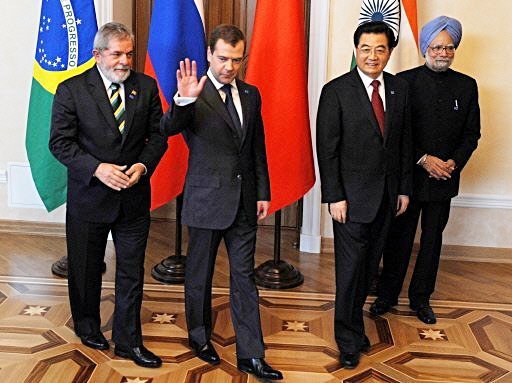BRIC BRIC BRIC BRIC BRIC BRIC BRIC

It seems all the news is buzzing about it. BRIC is suddenly real. Its first-ever summit, coinciding with the Shanghai Cooperation Organization Summit in Yekaterinburg (see my last post) has launched the 4-nation bloc onto the world stage and has elevated the acronym BRIC into the realm of common diplomatic parlance. Some news sources are calling BRIC a “new political bloc“. While the name BRIC has been around for several years, the four nations did accomplish a few political gestures during their first formal meeting:
- A resolution on membership and participation in global institutions. BRIC’s statement is as follows: “We are committed to advance the reform of international financial institutions so as to reflect changes in the world economy. The emerging and developing economies must have a greater voice” (Russia’s recently canceled application to the WTO replaced by a joint proposal with Belarus and Kazakhstan is one such example of this).
- Pledges to work together on issues pertaining to energy, food security, education and science. It remains to be seen if these nations can actually accomplish this. India and China in particular could benefit from energy and food partnerships
- A declaration calling for a “more diversified international monetary system”. This is basically a call for non dollar-based international reserve currency, and, as my commenter ACWorld points out, has been on Russia’s agenda for quite some time. Incidentally, the dollar lost ground yesterday as BRIC made its declaration.
Analysts are largely viewing the event as a rejection of continued US hegemony. But other important events took place at both BRIC and the simultaneous SCO.
Of note:
- Iranian President Mahmoud Ahmadinejad made a whirlwind visit to the summit to announce that “the age of empires has ended“
- Indian Prime Minister Manhoman Singh and Pakistani President Asif Ali Zardari met on the sidelines of the conferences to discuss potential cooperation, suggesting a thaw between the 2 nations.
- China pledged a $10 billion loan to SCO member nations to help shore up their crisis-stricken economies. This large aid package from Beijing points to continued Chinese economic clout and international influence.
All told, Russia certainly flexed its muscles by hosting the summit. But it was Beijing that proved itself most worthy and significant. By throwing around money and by forging key deals with Central Asian nations, China is continuing to prove itself a reliable economic partner with a talent at making the most it can of the financial crisis.
Photo Credit: AFP.
